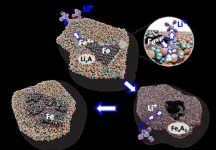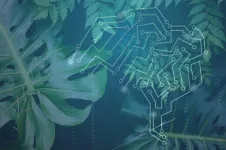(Press-News.org) URBANA, Ill. – Parents are often eager to give their adolescent children advice about school problems, but they may find that youth are less than receptive to their words of wisdom. However, kids who don’t seem to listen to their parents may still benefit from their input, a new study from the University of Illinois Urbana-Champaign shows.
The researchers looked at conversations between fifth-grade students and their mothers about academic problems, identifying mom’s advice strategies and the youth’s response. Then they correlated these findings with how the child coped after the transition to middle school the following year — often a difficult time with new peers and academic demands.
“We wanted to understand what's happening in actual conversations between parents and children. We focused on academic challenges such as difficulty understanding schoolwork, being bored in class, or problems with time management because academic expectations and pressure start to increase during this age. We wanted to know what parents are telling their kids about how to manage these stressors and how the kids are responding,” said lead author Kelly Tu, associate professor in the Department of Human Development and Family Studies, part of the College of Agricultural, Consumer and Environmental Sciences (ACES) at Illinois.
The study included a racially diverse community sample of 100 youth and their mothers. The pairs were asked to spend five minutes discussing an academic problem the child had recently experienced. The youth and their teachers completed a survey that addressed youth coping and school engagement. After the child started middle school the following year, the youth and one of their teachers again completed surveys.
The researchers found that mothers encouraged their children to deal with academic challenges in an active way. The three most common advice types were cognitive reappraisal (suggesting ways to reframe the problem, considering other explanations, thinking about experiences as learning opportunities), strategizing (encouraging youth to look for solutions), and help-seeking (finding someone who can help, such as a teacher, parent, or older sibling).
“We did not find that parents told their kids to ignore the problem and not worry about it, as we sometimes see with peer problems. With academics, and especially around the transition to middle school, parents wanted their kids to try and address the challenges,” Tu said.
Children’s responses ranged from agreeing and accepting to rejecting and dismissing mothers’ suggestions, but most were somewhere in the middle. Many youths reacted to their mother’s advice with ambiguous statements such as ‘maybe’ or ‘I don’t know.’
Tu said this might reflect the nature of a conversation, where youth need more information or some time to think things through, but it could also reflect the developmental period where adolescent children don’t necessarily want their mothers to weigh in on their problems.
Overall, the researchers found that youth whose mothers provided cognitive reappraisal solutions had more adaptive coping, whereas those who received more strategizing and help-seeking solutions did not. These are typically considered adaptive coping strategies, so this finding was surprising, Tu said.
Taking into account the effect of children’s responses, there were also some unexpected results. Children who rejected or responded ambiguously to their mother’s cognitive reappraisal advice actually reported more adaptive coping in middle school than those who accepted it.
“The kids are at an age where they're maturing and wanting to make their own decisions. Their immediate response may be resistance or reluctance, but the advice about how to reframe the problem, consider other explanations, or think about what they are learning from the experience, is sticking with them. They may need time to process and evaluate it. Maybe they didn’t find it useful in that specific situation they were discussing. But perhaps they came across new experiences in middle school and now they have some strategies to pull from their toolbox because mom gave them different ways to think about academic challenges,” Tu explained.
Furthermore, youth who accepted their mother’s help-seeking advice reported less adaptive coping in middle school than those who rejected it.
“The help-seeking advice we saw in these conversations was more straightforward, ‘Ask your teacher for help,’ and not as complex and nuanced as the cognitive reappraisal suggestions, and it may not be enough to address ongoing and/or complex academic challenges. If this is the only advice that kids are given, these kids may not be developing the skills to help themselves and might come to rely more on others,” Tu said.
She also points out that it’s possible some youth who readily agree with mom may simply want to appease their parent and move on from the conversation, without really processing the advice.
“One of the main takeaways from this study is the importance of providing kids with a wide range of suggestions they can apply in different situations, especially when youth are dealing with academic challenges. Even if they don't seem to be receptive in the moment, we are finding that some advice still has longer-term benefits,” she concluded.
The researchers chose to focus on mother-child dyads because mothers often are the primary caregiver who spends more time with youth and are more involved with day-to-day activities. But it would be important in future studies to also include the role of fathers, or have children identify which parent they usually go to for advice, they said.
The paper, “Academic challenges during early adolescence: Mothers’ advice and youth responses to advice,” is published in the Journal of Applied Developmental Psychology [https://doi.org/10.1016/j.appdev.2024.101648]. Authors include Kelly Tu, Xiaomei Li, Lisa Guntzviller, and Tianying Cai.
This research was supported by the USDA National Institute of Food and Agriculture, Hatch project (ILLU-793-344; PI: Kelly M. Tu) and a grant from the Eunice Kennedy Shriver National Institute of Child Health and Human Development (5R03HD100916–02) awarded to Kelly M. Tu. The content is solely the responsibility of the authors and does not necessarily represent the views of the National Institute of Food and Agriculture or the National Institute of Child Health and Human Development.
END
Does it matter if your kids listen to you? When adolescents reject mom’s advice, it still helps them cope
2024-05-23
ELSE PRESS RELEASES FROM THIS DATE:
Parents of the year: Scavenging raptors lead a collaborative home
2024-05-23
News Release
Journal of Raptor Research
For immediate release
Contact: [Zoey T. Greenberg]
science.writer@raptorresearchfoundation.com
360.739.7170
Parents of the Year: Scavenging Raptors Lead a Collaborative Home Life
Let’s face it, scavengers have a bad reputation. However, according to a new paper published in the Journal of Raptor Research, pairs of scavenging falcons called Chimango Caracaras (Milvago chimango) demonstrate an endearing level of collaboration while raising their chicks. In their paper, “Biparental Care in a Generalist Raptor, the Chimango Caracara in Central Argentina” Diego Gallego-García from ...
Latest from PsychENCODE: A cell-by-cell look at neuropsychiatric diseases
2024-05-23
Deciphering the genetic causes of common neurodevelopmental conditions like autism and common mental illnesses like bipolar disorder has been challenging – not least because of the size and complexity of the human brain – but a new package of research from a global group makes notable progress. Across Science, Science Translational Medicine, and Science Advances, more than a dozen reports from the PsychENCODE Consortium – established in 2015, and dedicated to illuminating the molecular ...
Researchers unveil shared and unique brain molecular dysregulations in PTSD and depression
2024-05-23
Study combines analyses of multiple genomic platforms over multiple brain regions to probe biological processes and underlying mechanisms of stress-related disorders
Results lay groundwork for future diagnostics and targeted treatments
BELMONT, Mass. (May 23, 2024) A comprehensive approach that examines the intersection of multiple biological processes is necessary to elucidate the development of stress-related disorders. In a new study, investigators from McLean Hospital, a member of the Mass General Brigham healthcare system, ...
Iron could be key to less expensive, greener lithium-ion batteries, research finds
2024-05-23
CORVALLIS, Ore. – What if a common element rather than scarce, expensive ones was a key component in electric car batteries?
A collaboration co-led by an Oregon State University chemistry researcher is hoping to spark a green battery revolution by showing that iron instead of cobalt and nickel can be used as a cathode material in lithium-ion batteries.
The findings, published today in Science Advances, are important for multiple reasons, Oregon State’s Xiulei “David” Ji notes.
“We’ve transformed the reactivity of iron metal, the cheapest metal commodity,” he said. “Our electrode can offer a higher energy density ...
Study uncovers cell type-specific genetic insights underlying schizophrenia
2024-05-23
BELMONT, Mass. (May 23, 2024) Schizophrenia is a complex disease with variable presentations, and the diverse nature of this mental health disorder has made understanding the mechanisms that cause the disease, and subsequently developing effective treatments, especially challenging. In a new study, published May 23 is Science, a team led by McLean Hospital researchers used comprehensive genetic and cellular analyses to shed new light on the intricate molecular mechanisms underlying schizophrenia. Their new work provides a map for how the genes known to increase risk of schizophrenia affect specific cells within the brain.
“We discovered which cell types express ...
A promising approach to develop a birth control pill for men
2024-05-23
The world’s population has increased by more than 2.6-fold in the last 60 years. The growing trend continues – projections indicate that the number of people living on our planet will grow to 9 billion by 2037 from 8 billion in 2022. These numbers underscore the need for considering family planning; however, there have been limited breakthroughs in contraception in recent decades. Specifically for men, there are no oral contraceptive pills available.
In a study published in the journal Science, researchers at Baylor College of Medicine and collaborating institutions show in animal models that a novel, non-hormonal sperm-specific approach offers a promising option ...
Artificial intelligence approaches demonstrate how plant science has evolved
2024-05-23
Artificial intelligence approaches demonstrate how plant science has evolved
Machine learning also reveals how model systems have changed and how countries differ in terms of research focus and impact
#####
In your coverage, please use this URL to provide access to the freely available paper in PLOS Biology: http://journals.plos.org/plosbiology/article?id=10.1371/journal.pbio.3002612
Article Title: Assessing the evolution of research topics in a biological field using plant science as ...
Birth of universe’s earliest galaxies observed for first time
2024-05-23
Using the James Webb Space Telescope, University of Copenhagen researchers have become the first to see the formation of three of the earliest galaxies in the universe, more than 13 billion years ago. The sensational discovery contributes important knowledge about the universe and is now published in the prestigious journal Science.
For the first time in the history of astronomy, researchers at the Niels Bohr Institute have witnessed the birth of three of the universe's absolute earliest galaxies, somewhere between 13.3 and 13.4 billion years ago.
The ...
New approach to Epstein-Barr virus and resulting diseases
2024-05-23
The Epstein-Barr virus can cause a spectrum of diseases, including a range of cancers. Emerging data now show that inhibition of a specific metabolic pathway in infected cells can diminish latent infection and therefore the risk of downstream disease, as reported by researchers from the University of Basel and the University Hospital Basel in the journal Science.
Exactly 60 years ago, pathologist Anthony Epstein and virologist Yvonne Barr announced the discovery of a virus that has carried their names ever since. The Epstein-Barr virus (EBV) made scientific history as the first virus proven to cause cancer in humans. Epstein and Barr isolated the pathogen, ...
Tracking the cellular and genetic roots of neuropsychiatric disease
2024-05-23
New Haven, Conn. – A new analysis has revealed detailed information about genetic variation in brain cells that could open new avenues for the targeted treatment of diseases such as schizophrenia and Alzheimer’s disease.
The findings, reported May 23 in Science, were the result of a multi-institutional collaboration known as PsychENCODE, founded in 2015 by the National Institutes of Health, which seeks new understandings of genomic influences on neuropsychiatric disease. The study was published alongside related studies in Science, Science Advances, and Science ...



